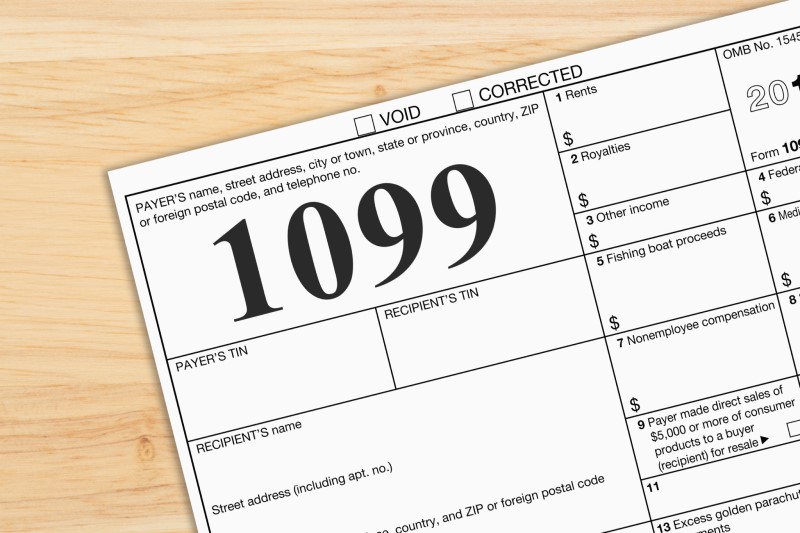
As independent contractors or 1099 workers, you’re essentially business owners. You’re responsible for managing your day-to-day responsibilities and setting your own hours. You may enjoy increased earning potential and have greater autonomy over your work. However, you’re not immune to the daily challenges that come with being self-employed.
For starters, you’re not eligible to receive employee benefits. Your monthly income also isn’t guaranteed. Some months you may earn more while other times you may earn less.
The good news is that independent contractors and 1099 workers have access to many of the same resources as other business owners. You may be able to take out a loan to make managing your day-to-day finances easier and expand your operations. Here’s our guide on personal loans for independent contractors and 1099 workers.
What is an Independent Contractor?
An independent contractor, or a 1099 contractor, is a self-employed person contracted to provide services for another company or business. Oftentimes, this work is performed independently or on a project-to-project basis.
Independent contractors don’t have a capped salary, instead they have flexible working hours and can choose the type of work projects they’d like to pursue. However, they don’t receive employee benefits – which means they have to foot their own health insurance costs and retirement savings. They are also responsible for paying estimated taxes on a quarterly basis.
Common Financial Issues Facing Independent Contractors
Working as an independent contractor has its benefits. Nonetheless, there are several challenges that come with being self-employed – which can result in financial uncertainty and stress.

Income Not Guaranteed
One of the perks of being an independent contractor is enjoying uncapped income. You can set your own rates and there are no limits on how much you can earn. However, the other side of this is that your income is constantly subject to change.
Regular employees with a set salary know how much they will bring in any given month. This isn’t the case with independent contractors, whose income is directly related to client needs and the number of projects you take on. This can make budgeting difficult and you may be prone to cash flow challenges – especially if you’re faced with an unanticipated expense.
Paying For Business Expenses Yourself
As a business owner, you’re responsible for paying all the expenses associated with your work. This includes office space, technology, raw materials, and more. You’ll be able to deduct expenses on your end of year tax returns, but in the meantime, you’ll have to manage them on your own.
It can be challenging to come with large sums of money, especially if you have unexpected expenses or if clients are falling behind on invoices. Cash flow disruptions are unfortunately a common burden for many independent contractors.
No Benefits Plan
Regular employees may receive health care plans, retirement plans, matching 401(k), paid vacations, or any number of benefits. As an independent contractor, you’re not entitled to these perks. As a result, you’ll have to be very diligent about setting funds aside for healthcare expenses, retirement savings, and other types of costs.
Job Security Is Not Guaranteed
It’s not uncommon for independent contractors to face employment uncertainty. Clients can change direction without notice or projects may be put on hold. Even if you have a contract readily in place, there’s always the risk the contract could be cancelled. There’s also no government legislation protecting independent contractors from workplace discrimination or other unfair labor practices.
Independent Contractor Loans
Many self-employed workers and business owners will seek out loans to mitigate cash flow issues and make it easier to meet financial obligations. Independent contractor loans can be especially helpful during slow seasons, if clients are behind payments, or if contracts end unexpectedly.
The best part about independent contractor loans is that they can be put to a number of different expenses. You can use an independent contractor loan to cover health insurance costs or to pay for raw materials. You can also use your loan to invest in marketing campaigns and expand your business.
With National, getting an independent contractor loan is simple and straightforward. There are funding options available for all types of credit scores and revenue scenarios. You can even secure financing with your unpaid invoices.
Pros and Cons of Personal Loans for Independent Contractors and 1099 Workers
Here are the pros and cons of personal loans for 1099 employees and independent contractors.
| Pros | Cons |
| Flexible terms Fast funding times Lump sum format Often no collateral requirements Lower qualifications (compared to business loans) | Lower funding amounts Risk of damaging your personal credit Lender fees Higher interest rates Potential for scams |
How to Qualify for Independent and 1099 Workers Loans
Qualifications will vary from lender to lender, but most institutions prioritize your income and credit score above all else. Still, there are a few documents you’ll need to provide.
- Personal information, like your social security number, if you aren’t using an EIN for your business
- Invoices
- Tax returns
- Bank statements
- Financial records
The latter four documents are used to prove your income, which is used to determine your eligibility, funding amounts, and more. Traditional businesses do this through the same documentation.
It’s important to research various lenders you could work with before applying. You’ll take note of their qualifications, funding times, reputation, and any other relevant factors to establish a list of top lenders, then apply with them.

Apply for a 1099 Loan in 3 Simple Steps
You can apply for an independent contract loan with National in as little as 3 easy steps. Your application will be reviewed in hours and you may be able to receive your funding amount shortly after. Follow these simple steps to get started.
- Submit an Application
Head over to National’s application page and fill out the online form. You’ll be asked to provide some basic information, but the overall process shouldn’t take more than a minute. Once you have submitted your application, a National Business Advisor will reach out to you within 24 hours. They will offer you an update on your application, ask for more information, and consult you on the best financing option for your situation.
- Review Your Offer
Once your documents have been received and verified, National will provide you with a list of financing solutions you’ll be able to choose from. You can consult with your Advisor of the different pros and cons to each alternative. Once you’re ready to make a decision, you’ll receive a promissory note to sign. Once that is signed, the money will be transferred to your account in as little as 2 to 3 business days!
- Start Making Payments
Once the money has been deposited into your account, you can begin using it any way you see fit! Just make sure to stay on top of your required payments. The good thing about National is that you could choose from a small business loan or revolving line of credit. Each option comes with different repayment terms so you have some flexibility in choosing which works best for you. In some cases, you may even be able to pay off your balance early without being charged a prepayment penalty.
Why Independent Contractors and 1099 Workers Are Choosing National
National is a leading financing provider to small businesses – including independent contractors and 1099 workers. We’ve found that self-employed individuals can benefit from the flexibility of our products and our fast approval rates. To learn more about what funding solutions you may qualify for, get in touch with a Business Financing Advisor here.
Frequently Asked Questions
Can Independent Contractors and 1099 Workers Get Personal Loans With Bad Credit?
Yes! Some lenders don’t hold credit scores as highly as others, which allows those with challenged credit histories to reach an approval. However, be aware that loans with lower credit score requirements often come with higher fees and interest rates.
How Does the Irregular Income of Independent Contractors and 1099 Workers Affect Loan Approval?
Lenders want to see consistent income to ensure the borrower can repay their outstanding balance effectively. The sporadic nature of independent contractors’ work doesn’t always yield consistent income, which causes a problem when applying for loans.
Some lenders understand this, while others do not. It’s important to work with a lender that aligns with your situation for this very reason.
Can an Independent Contractor Get a Personal Loan With No Credit Checks?
Yes, but it might not be the best idea. Lenders that don’t require credit checks are taking on an immense amount of risk. This translates into higher interest rates, more expensive fees, and less flexibility in your terms.
Keep in mind that some lenders that don’t require credit checks aren’t the most reputable. If you’re going to work with one of these lenders, make sure to dig deep into their reputation beforehand to ensure you can avoid shady organizations.
What Alternatives to Personal Loans Are Available for Independent Contractors and 1099 Workers?
If personal loans won’t work for you, there are a few alternatives. You can leverage credit cards, personal funds, or money from family/friends. You may also be able to take on an investor in certain situations.
If you need higher funding amounts, try a crowdfunding platform like Kickstarter or GoFundMe. However, there’s no guarantee that crowdfunding platforms will yield the funds you need, so it’s important to have other plans in place to avoid slowdowns.